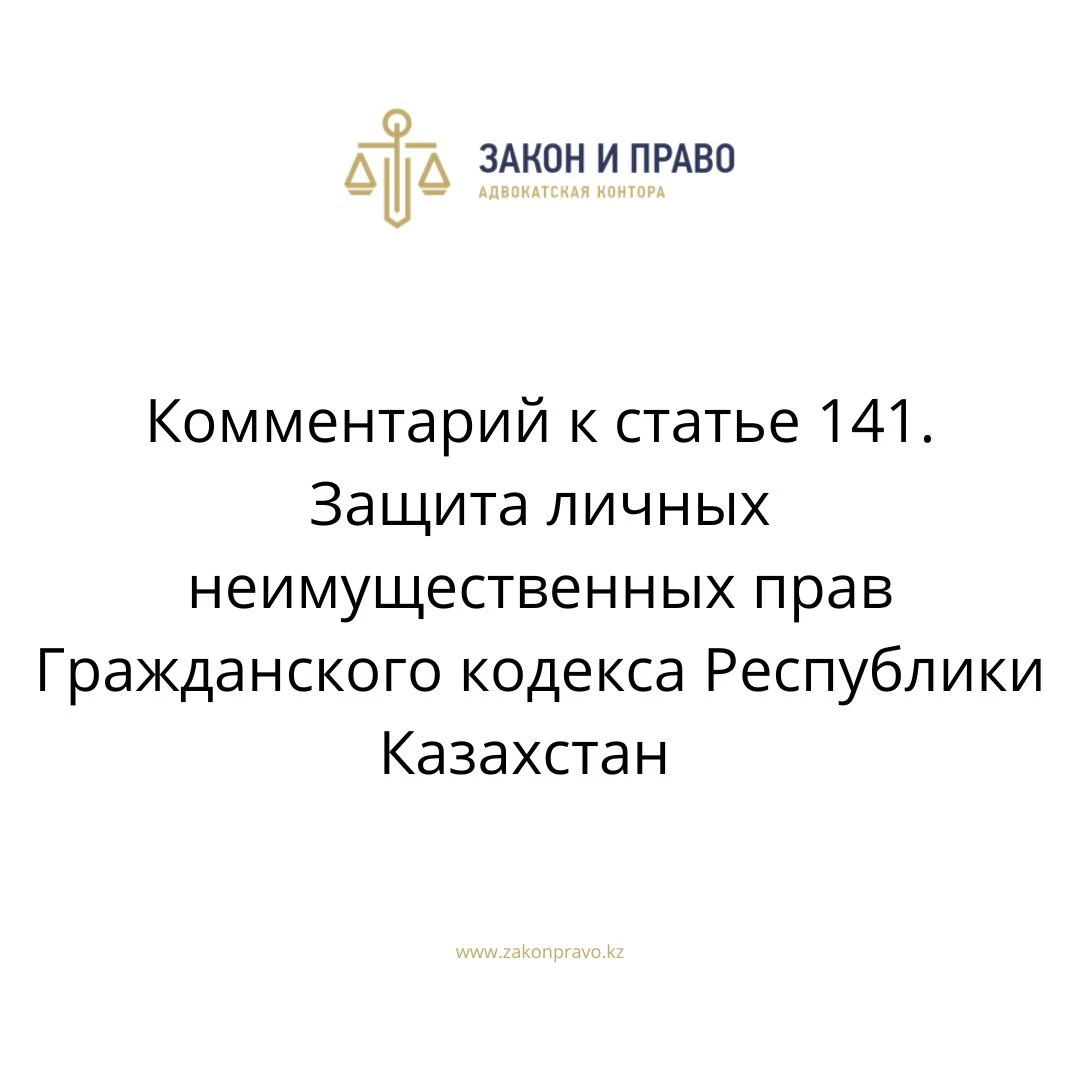Commentary to article 141. Protection of personal non-property rights of the Civil Code of the Republic of Kazakhstan
For the first time, the Civil Code includes a special paragraph on the regulation of personal non-property rights that are not related to property (although some of its provisions are aimed at regulating personal property rights, see Article 142 of the Civil Code). This is primarily due to the provisions of paragraph 2 of Article 1 of the Civil Code, according to which personal non-property relations that are not related to property are regulated by civil law, since otherwise is not provided for by legislative acts or does not follow from the essence of personal non-property relations.
Considering that Chapter 3 of the Civil Code does not provide an exhaustive list of personal non-property benefits and rights, paragraph 3 sets out only general rules for their protection, regardless of their individual types, and Articles 143-146 set out ways to protect only some of the most important types of personal non-property rights. It should be borne in mind that some of the types of personal rights, such as the right to a name, freedom of movement and choice of place of residence, are regulated by other articles of the Civil Code (see, for example, commentary to Articles 15, 16 of the Civil Code).
Personal non-property rights arise in relation to non-property benefits, and, accordingly, they are protected mainly in ways that are not intended to restore the violated property sphere of the victim. According to Article 9 of the Civil Code, such methods are: recognition of the right, restoration of the situation that existed before the violation of the right, suppression of actions that violate the right or create a threat of its violation. In addition, they are protected by the methods provided for in this paragraph, in particular, by refuting information discrediting the honor, dignity or business reputation of a citizen or a legal entity.
Since personal non-property rights are protected in well-defined ways, the relevant provisions of the civil procedure legislation are used when applying the norms, in particular the rules of art. 198 CPC "Decision obliging the defendant to commit certain acts" and art. 406 CPC "Execution of a decision obliging the debtor to commit certain acts."
Moral harm is moral or physical suffering (humiliation, irritation, depression, anger, shame, despair, physical pain, inferiority, discomfort, etc.) experienced (endured, endured) by the victim as a result of an offense committed against him.
Moral damage is compensated, regardless of the fault of the causer, if the damage is caused by the dissemination of information discrediting honor, dignity and business reputation.
When determining the amount of moral damage, both the victim's subjective assessment of the severity of the moral damage caused to him and objective data indicating the degree of moral and physical suffering of the victim are taken into account: the vital importance of the good that was the object of the encroachment (life, health, honor, dignity, freedom, inviolability of the home, etc.); the severity of the consequences of the offense, the nature of and the scope of spreading false and shameful information; the victim's living conditions (official, family, domestic, material, health status, age, etc.), and other circumstances worthy of attention.
Moral damage is compensated regardless of the proper compensation for property damage.
Taking into account the main focus of the protection of personal rights in terms of compensation, their protection is usually carried out regardless of the guilt of the offender.
Paragraph 4 of the commented article contains an important rule that develops the provisions of Article 9 of the Civil Code and grants the victim the right to take his own actions aimed at eliminating the consequences of the offense, and to entrust their commission to a third party. In particular, such a person may be a lawyer authorized to perform both actual and legally significant actions. In this case, the legal possibility of collecting expenses for the lawyer's remuneration is also established.
Constitution Law Code Standard Decree Order Decision Resolution Lawyer Almaty Lawyer Legal service Legal advice Civil Criminal Administrative cases Disputes Defense Arbitration Law Company Kazakhstan Law Firm Court Cases
The commentary was prepared within the framework of the scientific and practical research program of the Scientific Research Center of Private Law of the Kazakh State Law University.
Head of the working group on the preparation of the draft Civil Code of the Republic of Kazakhstan, Corresponding Member of the Academy of Sciences of the Republic of Kazakhstan, Professor Suleimenov M.K.
Deputy head Professor Basin Yu.G.


